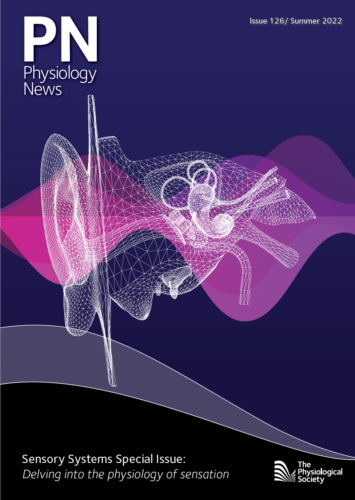
Physiology News Magazine
What is it like to lose one’s sense of taste and smell?
Membership
What is it like to lose one’s sense of taste and smell?
Membership

https://doi.org/10.36866/pn.126.38
Noemi Vadaszy, PhD Student
University of Leicester, UK
Member, Noemi Vadaszy, University of Leicester, UK describes the sensory impact of COVID-19, sharing the onset and sensation of losing her sense of taste and smell when infected with the virus.
A sudden loss of taste
I lost my sense of taste on the third day of my illness. While brushing my teeth, I noticed that my toothpaste tasted very different. Thinking back, it tasted like a weird medicine that you resist as a child. At the time I was quite ill and did not give too much attention to it; I noted the difference in my head and went to bed.
The next morning my coffee tasted like warm water. It was then that I realised that I had lost or partially lost my taste. At the time I was not too worried because I assumed it would come back, despite having heard it could take people months to regain their taste.
Ongoing symptoms
I lost my sense of taste and smell for a month. For about 2-3 weeks, I couldn’t taste anything apart from salt. Then, I gradually regained my sense of taste. I remember my first “symptom-free” day was three weeks after I got my positive test. My friend and I ordered a meal to celebrate our recovery. At that point, I was craving a big burger but with the first bite, I realised something was still off. I could not taste the meat in the burger at all. Instead, I could feel a strange blood-like taste in my mouth with cheese (apologies if this is too grotesque).
There were some funny situations too though. I made a spaghetti bolognese about a week later and as you do, I added some garlic. When I asked my friend whether I put enough garlic in or not; with tears in her eyes, she replied: “Yes, you definitely did!” Even then I couldn’t taste the flavours of foods, only detecting the basic taste range.
The psychological impact
Before getting COVID-19, I thought this symptom was the same as when you have a cold, and flavours of foods are altered or decreased. However, it was not like that at all. It is a partial or complete loss of taste. Psychologically this was the hardest symptom of my illness. When sick, all you want is a nice cup of tea or a meal that is easy to consume. However, when you have no taste or smell and are too ill to do anything else, you are just waiting for the illness to go. Because of having very little taste, I could only eat Pho soup as it was hot and salty, and I felt it helped me relax. I lost 4 kilograms during my illness simply because I did not want to eat. I felt like I was poisoned; my tongue felt odd too, which made it difficult to eat.
Lack of interest in food
It certainly changed my interest in food. When I tried to eat some brownies during the height of my illness, it left me with some strange memories. The brownie felt like moulded mud in my mouth (again apologies for being too grotesque). I could not look at brownies for a while after that. It is odd how it only influenced my interest in food though. I kept drinking coffee and tea even though I could not taste them. This may be because of how weird my tongue was feeling physically; when you drink your tongue is less involved. Or it could be related to how losing my sense of taste affected my psychological wellbeing and I wanted these drinks because they usually help me relax.
A newfound like
Luckily, there were no real lasting effects. It took me a while to start eating properly again and every time I ate something I was cautious because I wasn’t sure if I would be able to taste it. The only major lasting effect is that I really like Pho soup now.
